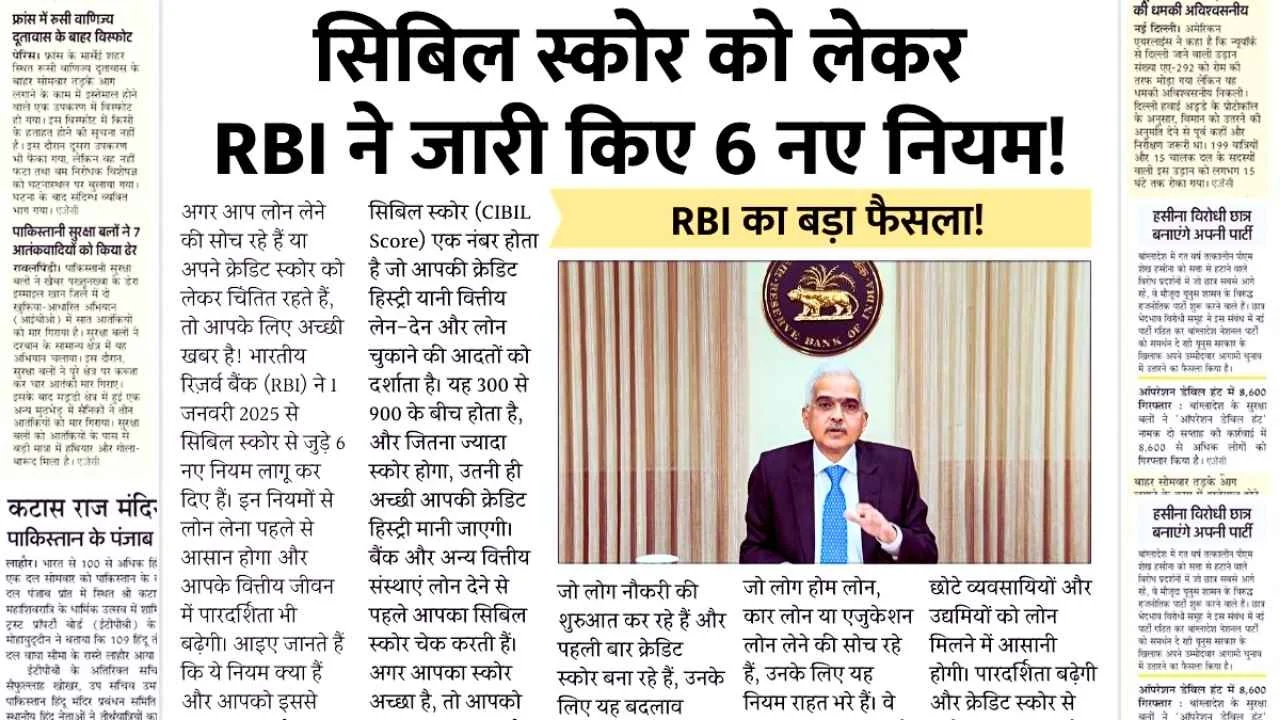In a major update for loan seekers across India, the Reserve Bank of India (RBI) has rolled out a new set of regulations aimed at making the country’s credit ecosystem more transparent, efficient, and borrower-friendly. Effective January 1, 2025, these new norms are expected to bring significant relief to individuals struggling with low credit scores.
The core of the reforms focuses on faster CIBIL score updates, improved transparency in loan approvals and rejections, and safeguards against credit score damage from technical or short-term issues.
CIBIL Scores to Be Updated Every 15 Days
Until now, banks and financial institutions were required to report customer credit data to credit bureaus only once a month. This often resulted in a 30-40 day delay in reflecting loan repayments or credit improvements on a borrower’s report.
Under the new guidelines, financial institutions must update credit information every 15 days with bureaus such as CIBIL, Experian, Equifax, and CRIF High Mark. This means if a borrower repays a loan or clears an EMI on time, their improved credit behavior will reflect much sooner — potentially leading to faster access to new loans and lower interest rates.
30-Day Grace Period Before EMI Bounces Impact Score
Another key provision offers a grace period for missed EMIs. If an EMI bounces, lenders must now provide a 30-day notice to the borrower before reporting the default to credit bureaus. This gives customers an opportunity to correct errors or clear dues, ensuring their credit score doesn’t take an immediate hit due to short-term cash flow issues or technical problems.
This safeguard will apply to personal loans, home loans, auto loans, and credit card repayments, offering broader protection to a wide range of borrowers.
Lenders Must Explain Loan Rejections and Fix Report Errors Promptly
In a push for transparency, the RBI now mandates that banks must clearly disclose the reason if a loan is denied due to a borrower’s credit score. Furthermore, if there is an error in the credit report, borrowers will be given 30 days to raise a correction request.
If the error is not resolved within this time frame, the responsible bank or credit bureau will have to compensate the borrower ₹100 per day of delay. This marks a significant step toward empowering consumers and ensuring accountability within the credit system.
Key Benefits of the New RBI Credit Reporting Rules
| New Rule | Benefit |
|---|---|
| Credit data to be updated every 15 days | Faster improvement in CIBIL scores |
| 30-day notice before reporting EMI bounce | Protection from sudden score drops |
| Mandatory disclosure of loan rejection | Increased transparency |
| 30-day window to correct report errors | Time to improve score without penalties |
How to Improve Your CIBIL Score
If your credit score is currently low, here are some actionable steps to improve it:
- Pay all EMIs and credit card bills on time
- Keep credit card utilization below 30%
- Avoid frequent loan or card applications
- Review your credit report regularly and correct any errors
- Consider taking secured loans like gold loans to build credit history
Don’t Miss the Opportunity
These new RBI rules are a game-changer for individuals with poor or limited credit history. With faster score updates and consumer protections in place, it’s now easier to repair your credit standing and access financial products.
Consumers are encouraged to check their credit reports at least once a year — which can be done for free on CIBIL’s official website or via bureaus like Experian, Equifax, or CRIF. For those planning to apply for a loan soon, now is the perfect time to focus on building a healthier credit profile — it could make a significant difference in your financial future.

